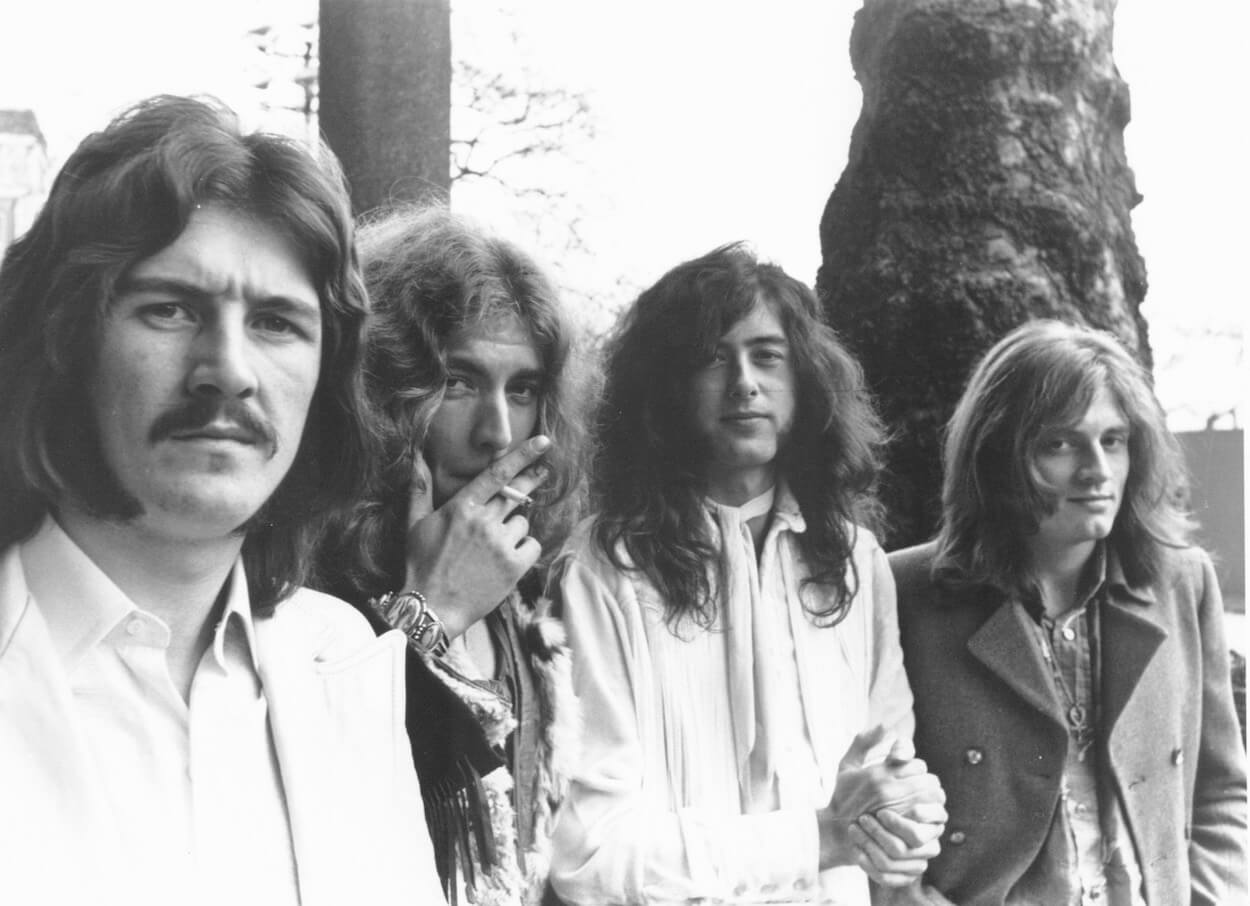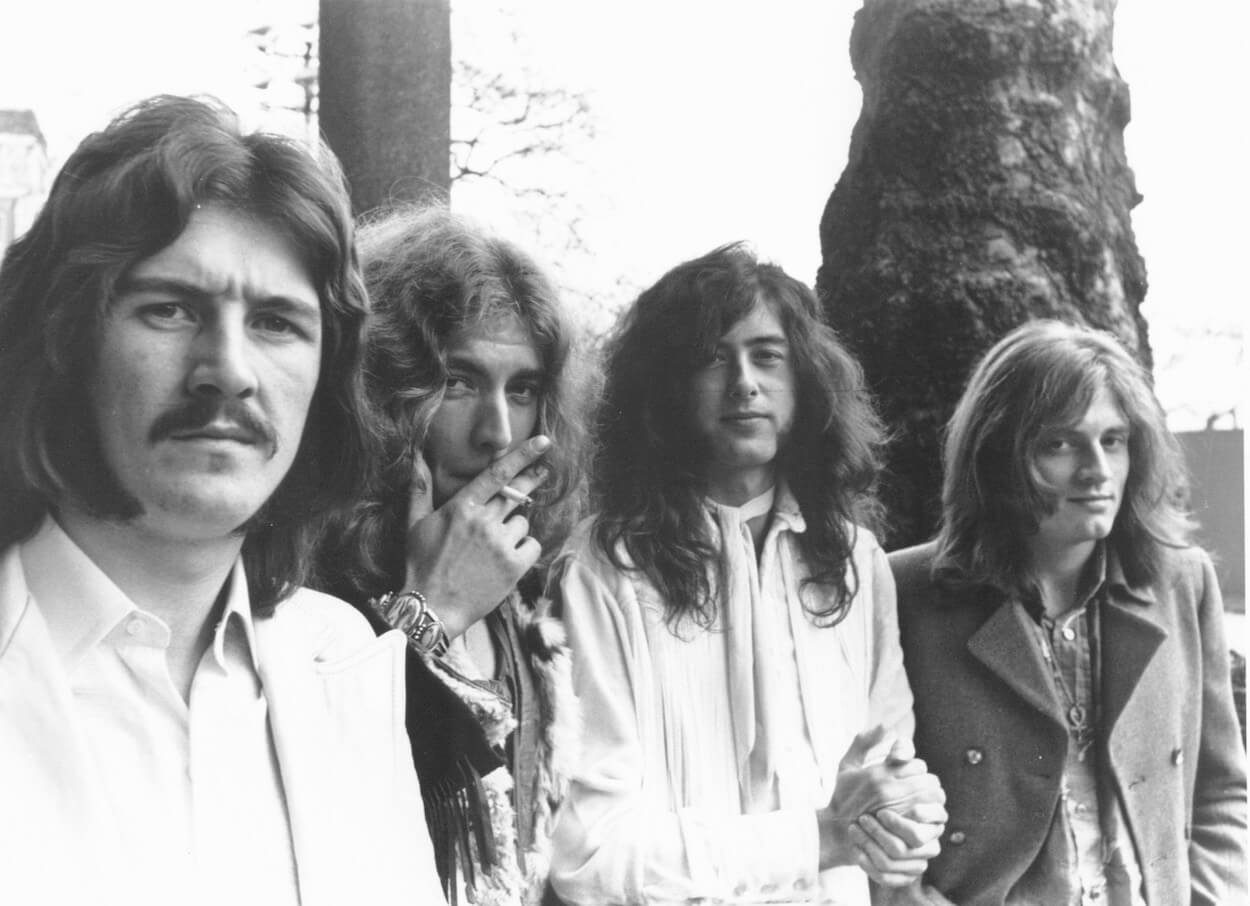
Led Zeppelin: 10 Essential Songs for New Fans to Listen To
Led Zeppelin made the most of their relatively brief time together. They made eight studio albums between 1969 and 1979, added a 1976 movie soundtrack, and released a posthumous record in 1982. Ranking all 86 Led Zeppelin songs is a fool’s errand, unless the errand is to spark debate. It’s far easier to narrow the scope. So let’s look at the 10 Led Zeppelin songs that are essential listening for new fans (in chronological order).

1. ‘You Shook Me’
Led Zeppelin’s debut album (1969) featured several songs that firmly announced the band’s presence. With all due respect for “Good Times Bad Times,” “Communication Breakdown,” “How Many More Times,” and “Dazed and Confused” (more on that later), “You Shook Me” might be the most essential song on the record.
Each Led Zeppelin member took a solo: John Paul Jones on organ, singer Robert Plant on harmonica, Jimmy Page on guitar, and John Bonham pounding out several thunderous fills behind Plant and Page. That pair employed their call-and-response guitar-and-vocal trick for the first time, and “You Shook Me” could be in the running for the rarest Led Zeppelin song since it was the only time Page played a Gibson Flying V with the band.
2. ‘Whole Lotta Love’
You can’t escape some Led Zeppelin songs being the essential ones. “Whole Lotta Love” is the perfect example. It’s one of the band’s most well-known tunes, and it’s absolutely critical for new Led Zeppelin fans to take a listen.
Page’s muscular and lusty yet relatively simple main riff on the Led Zeppelin II (1969) opener is almost synonymous with classic rock. It’s the riff both the Edge and Jack White geeked out over in the movie It Might Get Loud. Led Zeppelin maintained the groove for about 1:20. Then they took a turn into heavy psychedelia with an instrumental freakout that lasted nearly two minutes.
Bonham grabbed a well-miked drum solo — listeners can hear every cymbal bell tap and high hat closure as if he were playing in front of them. Page’s behind-the-scenes work orchestrating the stereo panning and reverb effects made his theremin playing and guitar string pulls sound almost demonic. Decades later, “Whole Lotta Love” holds up as a Led Zeppelin classic and a must-listen for any classic rock fan.
3. ‘Immigrant Song’
What makes “Immigrant Song” one of the essential Led Zeppelin songs? Like “Whole Lotta Love,” it’s shorthand for classic rock. It’s the song that is so iconic and recognizable — stabbing guitar riff, Plant’s Valkyrie howl, Bonham’s bass drum-heavy beat, and Jone’s galloping bass — that Led Zeppelin earned a $2 million paycheck for letting it be used in a Marvel movie.
But don’t take our word for it. When David Letterman asked the three surviving members (Bonham died in 1980) to describe their music in a sentence, Jones mouthed the riff in response (via YouTube). If one of the main players believed “Immigrant Song” is an essential Led Zeppelin song, then who are we to argue?
4. ‘Since I’ve Been Loving You’
Despite “Immigrant Song” being a standout lead track, “Since I’ve Been Loving You” is the crown jewel of the Led Zeppelin III tracklist. The band had a reputation as heavy bashers, but the slow blues from their 1970 record proved they had restraint and a mastery of much more than straight-forward hard rock.
Plant once said he didn’t learn how to sing until the band made Led Zeppelin III. His vocals on “Since I’ve Been Loving You,” which started quietly but rose to meet the emotion of the song, are a highlight. So was Bonham’s restraint, which was 100% necessary. And Page delivered perhaps his greatest guitar solo of any Led Zeppelin song. “Since I’ve Been Loving You” is not to be missed.
5. ‘Black Dog’
You could almost throw a dart at the Led Zeppelin IV track list and call any of those songs essential Led Zeppelin tunes. At the very least, you could make a compelling case. Album opener “Black Dog” gets our vote as an indispensable track from the band’s catalog.
Jones wrote the charging, circular riff — which expands and contracts like a giant catching its breath — and Page plugged directly into the recording console and triple-tracked his guitar to make it sound heavier. “Black Dog” was also one of the most rhythmically complex songs the band had recorded to that point (1971), though Led Zeppelin IV included another tough drum test with “Four Sticks.”
6. ‘Stairway to Heaven’
You can’t discuss Led Zeppelin’s essential songs without mentioning “Stairway to Heaven.” It’s obligatory. It was almost as if everything the band had done up until that point had been building toward the song.
Page was always overlooked as a composer, but “Stairway to Heaven” was one example that proved his chops. His delicate acoustic strums in the intro segued to bright 12-string guitar riffs (that he played on two instruments — a Fender and a Vox — to create tonal differences) before he launched into one of the greatest guitar solos of all time, which he played on a Fender Telecaster. Plant’s timeless lyrics meant “Stairway to Heaven” had no expiration date, which is why it has endured as probably the most essential of Led Zeppelin Songs.
7. ‘Over the Hills and Far Away’
We couldn’t possibly skip over Houses of the Holy (1973), which saw Led Zeppelin at its most carefree. It showcased the band before rock star excess and personal drama derailed their momentum. Like its predecessor, you could make a case for almost any tune being essential for new Led Zeppelin fans to listen to, but our choice is “Over the Hills and Far Away.”
Page always planned for the band to have a light and shade approach to its music. He never wanted Zep to be pinned down to one style, and “Over the Hills” gave fans stylistic diversity.
The guitarist opened with a beautiful acoustic guitar line, which Plant matched with delicate vocals when he joined the song roughly 50 seconds in. Page moved up the neck for some folk-rock-like strumming before a sudden switch to brawny power chords. His solo might not be one of his finest, but it fits the song and Jones’ funky bass riffing underneath it.
8. ‘Kashmir’
Just like “Immigrant Song” above, this one wasn’t entirely up to us. Both Page and Plant called “Kashmir” Led Zeppelin’s definitive song, which sounds an awful lot like the most crucial song to us. And it’s easy to see why.
The signature escalating guitar riff, careful orchestration, complex arrangement, excursion into Eastern sounds, and grand scope make it an epic for the ages. The Physical Graffiti (1975) centerpiece might be Led Zeppelin at their grandest, though “In the Light,” the ambitious track that followed “Kashmir” on the album, deserves a nod for being one of the band’s most underrated songs.
9. ‘Dazed and Confused’ (from ‘The Song Remains the Same’)
The studio recordings of Led Zeppelin’s songs were merely jumping off points. The band’s music took on new life when they played it live. That’s one of the reasons the band couldn’t replace Bonham and carry on when he died — his chemistry and ability to groove with his bandmates were impossible to replicate.
The nearly 30-minute live version of “Dazed and Confused” from the soundtrack to The Song Remains the Same (1976, though the band recorded the tune in 1973) was case in point. While the later version delayed the scorching Page solo from the 1969 studio version, it fully displayed Led Zeppelin’s ability to stretch out and jam.
The glacial pace of the opening verses eventually gives way to a galloping jam starting around 4:00. That jam portion saw the band lean toward atmospheric space rock (starting about 6:00 in) before Page’s seven-minute bowed-guitar soundscapes took over at the 9:00 mark. They picked up the pace again 16 minutes in as Page let loose with a blistering solo. The studio cut was the blueprint, and Led Zeppelin built a sonic temple using those plans with “Dazed and Confused.”
10. ‘Fool in the Rain’
Led Zeppelin’s earliest albums contained most of their most recognizable hits. Still, “Fool in the Rain” from 1979’s In Through the Out Door might have been the band’s final phenomenal song. Jones’ piano riff and Page’s guitar line marched in lockstep over Bonham’s shuffle beat. The guitarist added some 12-string flair. Then at 2:26, it switched gears to a full-on samba jam that wouldn’t have sounded out of place at Carnival.
Page threw in a fun and well-played solo that lasted more than a minute. The unique, thick, distorted sound came from an Octivider effect that sent out notes at multiple octaves simultaneously. “Fool in the Rain” was a highlight of the final record they made as an active band and quietly one of the essential Led Zeppelin songs for newcomers.
For more on the entertainment world and exclusive interviews, subscribe to Showbiz Cheat Sheet’s YouTube channel.


